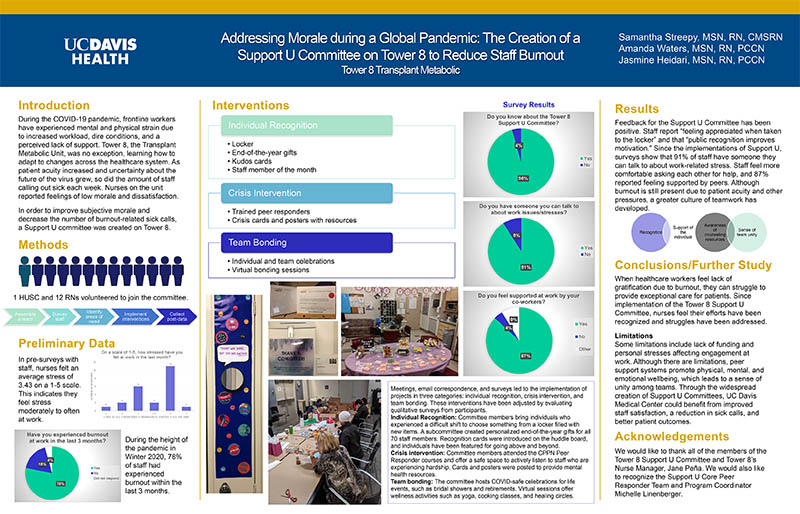
Hover to pan and click to magnify. Click again to pan at full screen.
Samantha Streepy, MSN, RN, CMSRN
Amanda Waters, MSN, RN, PCCN
Jasmine Heidari, MSN, RN, PCCN
Samantha Streepy, MSN, RN, CMSRN
Amanda Waters, MSN, RN, PCCN
Jasmine Heidari, MSN, RN, PCCN
UC Davis Health
Tower 8 Transplant Metabolic
ABSTRACT
Addressing Morale during a Global Pandemic: The Creation of a Support U Committee on Tower 8 to Reduce Staff Burnout
During the COVID-19 pandemic, frontline workers have experienced mental and physical strain due to increased workload, dire conditions, and a perceived lack of support in the face of a deadly threat. Tower 8, the Transplant Metabolic Unit, was no exception, learning how to adapt to changes across the healthcare system. A survey demonstrated that 78% of Tower 8 nurses had experienced burnout at work within the past three months, and a majority felt “a lot of stress” on an average workday. With a high volume of staff calling out sick, low morale and dissatisfaction spread.
The purpose of this project was to provide a peer support system through the creation of a “Support U” Committee. By promoting unity and addressing unit stressors, staff would experience a reduction in burnout and number of sick calls.
The Tower 8 Support U Committee garnered interest from twelve nurses and one HUSC. Meetings, email correspondence, and pre-surveys indicated the need to improve in three main categories: individual recognition, crisis intervention, and team bonding. A locker filled with new items (e.g. snacks, stationary, lotions) serves as one type of recognition, as committee members bring individuals who experienced a difficult shift to choose something. A subcommittee created end of the year gifts for all 70 staff members, as well as organized COVID-safe celebrations for life events, such as bridal showers and retirements. Additionally, recognition cards and “staff member of the month” were introduced on the huddle board. For crisis intervention, committee members attended the CPPN Peer Responder courses and offer a safe space to actively listen to staff experiencing hardship. To address team bonding, monthly virtual sessions offer wellness activities such as guided yoga, cooking classes, and healing circles. The efficacy of these interventions has been evaluated through surveys and oral interviews with staff.
Feedback for the Support U Committee has been largely positive post-intervention. Staff report “feeling appreciated when taken to the locker” and that “public recognition improves motivation.” After the peer responder program was introduced, post-surveys showed that 91% of staff have someone they can talk to about work-related stress. As a result of the bonding activities, staff feel more comfortable asking for help, and 87% reported feeling supported by peers. Although burnout is still present due to patient acuity and outside pressures, a greater culture of teamwork has developed.
When healthcare workers feel lack of gratification due to burnout, they can struggle to provide exceptional care for patients. Since the implementation of the Tower 8 Support U Committee, nurses feel their efforts have been recognized and their struggles have been addressed. Some limitations of the project include lack of funding and personal stresses affecting engagement at work. Although there are limitations, peer support systems as a whole promote physical, mental, and emotional wellbeing, which leads to a sense of unity among teams. Through the creation of Support U Committees, UC Davis Medical Center could benefit from improved staff satisfaction, a reduction in sick calls, and better patient outcomes.

DISQUS COMMENTS WILL BE SHOWN ONLY WHEN YOUR SITE IS ONLINE